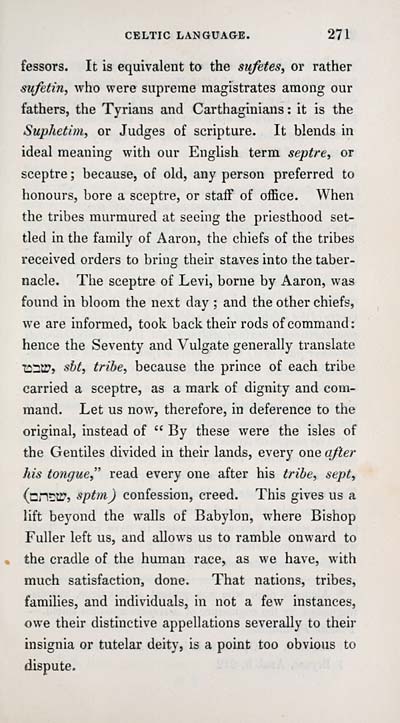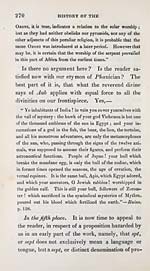Download files
Complete book:
Individual page:
Thumbnail gallery: Grid view | List view

CELTIC LANGUAGE. 271
fessors. It is equivalent to the sufetes, or rather
sufetin, who were supreme magistrates among our
fathers, the Tyrians and Carthaginians : it is the
Suphetim, or Judges of scripture. It blends in
ideal meaning with our EngUsh term septre, or
sceptre ; because, of old, any person preferred to
honours, bore a sceptve, or stafF of office. When
the tribes murmured at seeing the priesthood set-
tled in the family of Aaron, the chiefs of the tribes
received orders to bring their staves into the taber-
nacle. The sceptre of Levi, borne by Aaron, was
found in bloom the next day ; and the other chiefs,
we are informed, took back their rods of command :
hence the Seventy and Vulgate generally tvanslate
■^sntc, sbt, tribe, because the prince of each tribe
carried a sceptre, as a mark of dignity and com-
mand. Let us now, therefore, in deference to the
original, instead of " By these were the isles of
the Gentiles divided in their lands, every one after
his tongue," read every one after his tribe, sept,
(cn?:tr, sptm) confession, creed. This gives us a
lift beyond the walls of Babylon, where Bishop
FuUer left us, and allows us to ramble onward to
the cvadle of the human race, as we have, with
much satisfaction, done. That nations, tribes,
famiUes, and individuals, in not a few instances,
owe their distinctive appellations severally to their
insignia or tutelar deity, is a point too obvious to
dispute.
fessors. It is equivalent to the sufetes, or rather
sufetin, who were supreme magistrates among our
fathers, the Tyrians and Carthaginians : it is the
Suphetim, or Judges of scripture. It blends in
ideal meaning with our EngUsh term septre, or
sceptre ; because, of old, any person preferred to
honours, bore a sceptve, or stafF of office. When
the tribes murmured at seeing the priesthood set-
tled in the family of Aaron, the chiefs of the tribes
received orders to bring their staves into the taber-
nacle. The sceptre of Levi, borne by Aaron, was
found in bloom the next day ; and the other chiefs,
we are informed, took back their rods of command :
hence the Seventy and Vulgate generally tvanslate
■^sntc, sbt, tribe, because the prince of each tribe
carried a sceptre, as a mark of dignity and com-
mand. Let us now, therefore, in deference to the
original, instead of " By these were the isles of
the Gentiles divided in their lands, every one after
his tongue," read every one after his tribe, sept,
(cn?:tr, sptm) confession, creed. This gives us a
lift beyond the walls of Babylon, where Bishop
FuUer left us, and allows us to ramble onward to
the cvadle of the human race, as we have, with
much satisfaction, done. That nations, tribes,
famiUes, and individuals, in not a few instances,
owe their distinctive appellations severally to their
insignia or tutelar deity, is a point too obvious to
dispute.
Set display mode to: Large image | Transcription
Images and transcriptions on this page, including medium image downloads, may be used under the Creative Commons Attribution 4.0 International Licence unless otherwise stated. ![]()
| Early Gaelic Book Collections > Hew Morrison Collection > Adhamh agus Eubh, no Craobh Sheanachais nan Gàël > (401) |
|---|
| Permanent URL | https://digital.nls.uk/76901453 |
|---|
| Description | A selection of items from a collection of 320 volumes and 30 pamphlets of literary and religious works in Scottish Gaelic. From the personal library of Hew Morrison, the first City Librarian of Edinburgh. |
|---|
| Description | Selected items from five 'Special and Named Printed Collections'. Includes books in Gaelic and other Celtic languages, works about the Gaels, their languages, literature, culture and history. |
|---|

